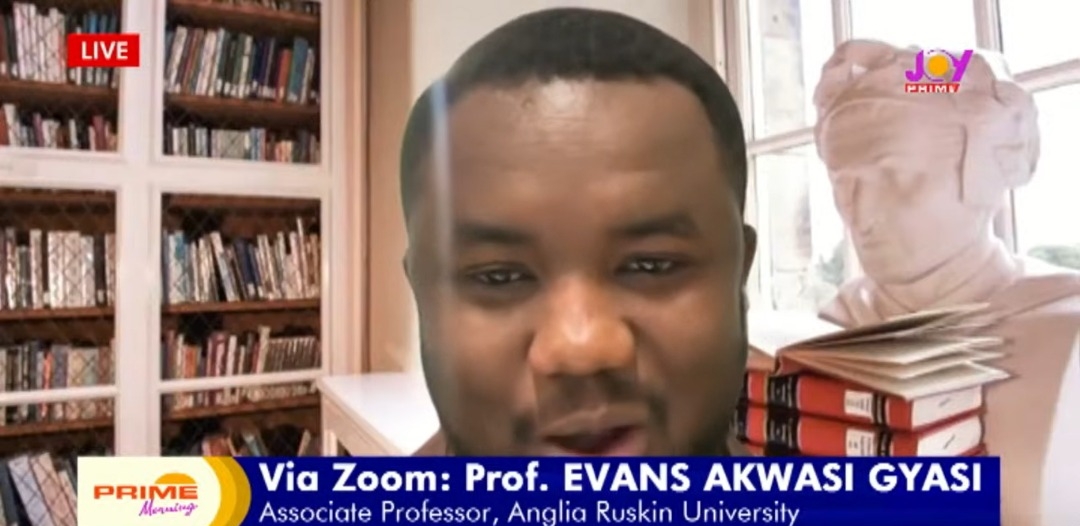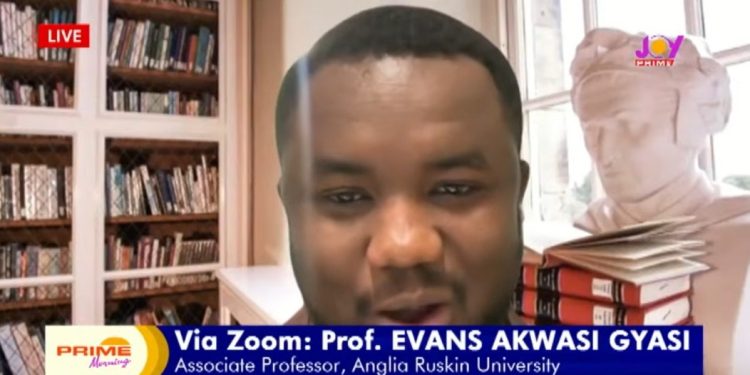
The Governor of the Bank of Ghana (BoG), Dr. Pandit Johnson Asiama’s speech at the Graphic Business Breakfast Meeting on Tuesday, July 15, on the theme “Sustaining Forex Gains: Business and Economic Impact”, offers a timely and comprehensive assessment of Ghana’s evolving macroeconomic environment.
Delivered in a climate of cautious optimism, the address outlines Ghana’s foreign exchange (forex) recovery, highlights underlying vulnerabilities, and advocates for structural reforms to ensure that forex stability translates into inclusive economic growth.
While the speech succeeds in acknowledging the complexity of Ghana’s economic terrain and articulating a vision for monetary resilience, several key academic and policy questions remain regarding the sustainability, inclusivity, and equity of the proposed path forward.
Restoring confidence: Achievements in macroeconomic stabilisation
The Governor begins by highlighting macroeconomic progress: the Ghanaian cedi has appreciated by over 42% year-to-date, international reserves have reached US$11.1 billion, and a robust trade surplus of US$4.14 billion has been recorded in the first quarter of 2025.
These developments signal a significant reversal of the depreciation experienced during the 2022–2023 economic downturn, a period marked by fiscal slippage, rising inflation, and widespread public discontent (IMF, 2024).
These improvements, according to the Governor, are largely attributable to synchronised fiscal and monetary reforms under the IMF-supported program. The BoG’s commitment to disinflation via a 28% policy rate, sterilisation of liquidity through Open Market Operations (OMO), and structured forex interventions reflects textbook central banking responses to external imbalances (Mishkin, 2019).
In parallel, the Ministry of Finance has pursued fiscal consolidation, a necessary albeit politically costly path, following the Domestic Debt Exchange Programme (DDEP).
However, while these macroeconomic indicators inspire confidence, the sustainability of the gains remains uncertain. Scholars such as Rodrik (2008) argue that short-term macroeconomic stabilisation—especially in emerging economies—must be followed by institutional reforms and export diversification to ensure long-run growth.
The Governor’s speech reflects this perspective by shifting the discourse from “stabilisation to sustainability,” but further scrutiny is warranted.
Structural challenges and policy dilemmas
The speech candidly acknowledges the structural fragilities underpinning Ghana’s forex position, notably over-dependence on primary commodities, gold, cocoa, and oil.
These are notoriously price-volatile sectors, highly susceptible to external shocks, including geopolitical instability and global interest rate cycles (World Bank, 2023). The Governor’s own reference to elevated gold prices due to the Iran-Israel conflict illustrates the tenuousness of Ghana’s forex gains.
Furthermore, Ghana’s import dependency, particularly for energy and capital goods, creates seasonal pressure on foreign reserves. This structural imbalance echoes what Sachs (1989) terms the “resource curse paradox,” where resource-rich countries struggle to translate export earnings into long-term development due to poor diversification and weak domestic reinvestment.
The behavioural dimensions raised, such as persistent dollarisation in domestic transactions and limited forex retention by exporters, are also central. Academic literature points to “currency substitution” as a symptom of weak institutional credibility and low public trust in monetary authorities (Calvo & Vegh, 1992).
While the Governor commits to enhanced enforcement of legal tender laws, punitive approaches alone are unlikely to succeed. Instead, as argued by Hausmann et al. (2005), restoring domestic currency dominance requires consistent inflation targeting, robust financial market infrastructure, and incentives for local currency usage.
Another policy dilemma concerns the exchange rate’s double-edged effect: while a stronger cedi helps tame inflation and enhances import affordability, it risks undermining export competitiveness.
This “Dutch Disease” risk is well documented in international economics and requires careful management (Corden, 1984). The Governor’s acknowledgment of this tension is commendable, though his proposed balance, avoiding over-tightening, requires precise calibration, especially as private sector credit growth remains subdued post-DDEP.
Translating gains into real-sector transformation
Perhaps the most compelling part of the address lies in the forward-looking strategy to translate forex stability into real-sector development.
The four pillars—enhancing forex retention, deepening the export base, improving FX market efficiency, and promoting cedi usage—form a robust framework.
These align with recommendations from AfDB (2023), which emphasize trade competitiveness and value addition as anchors of sustainable growth. The push for SMEs to engage in forex-generating activities through digital trade and fintech is particularly significant.
Ghana’s youthful population and tech-savvy entrepreneurial base could be empowered through digital platforms to access global markets. This resonates with UNCTAD (2021) findings on the potential of e-commerce and digital finance to democratize trade participation for small firms in developing economies.
However, the roadmap for non-traditional exports—like digital services, architecture, and creative industries—requires more than policy encouragement. It necessitates investment in education, digital infrastructure, IP protection, and global branding.
A stronger link between macroeconomic policy and human capital development is needed, something that was only lightly touched on in the speech.
Similarly, while the Governor emphasized derivatives and FX risk hedging as essential for market maturity, Ghana’s financial literacy and institutional depth remain limited. Research by Aryeetey & Baah-Boateng (2022) underscores that most SMEs lack access to affordable credit, let alone sophisticated hedging instruments. Thus, financial sector reform, both regulatory and developmental, is critical.
Public-Private collaboration and the role of institutions
The Governor rightly frames forex sustainability as a collective responsibility involving government, businesses, banks, and citizens. His call for businesses to integrate forex risk into strategic planning, and for regulators to act as facilitators rather than enforcers, reflects contemporary thinking in monetary governance (Goodhart, 2010).
Moreover, the emphasis on co-designing innovations such as the eCedi signals a welcome shift toward participatory regulation. Still, institutional accountability must be foregrounded.
The 2022–2023 crisis exposed weaknesses in both fiscal discipline and central bank independence, particularly amid allegations of central bank financing of government deficits (BoG Annual Report, 2023).
Trust must be rebuilt not only through performance but through transparency, communication, and civil society engagement.
Conclusion: Toward a resilient and inclusive Forex Ecosystem
In conclusion, the BoG Governor’s speech is a measured yet forward-leaning narrative that situates forex stability within the broader goal of economic transformation.
It acknowledges past policy missteps, celebrates hard-won gains, and articulates a thoughtful roadmap for sustainability.
However, the path forward must involve:
- Institutional strengthening to ensure credible, autonomous economic policymaking.
- Diversification beyond commodity exports, anchored in value chains and human capital.
- Financial innovation that includes—not excludes—SMEs and the informal sector.
- A cultural and behavioural shift toward Cedi confidence, led by trust, not coercion.
As the Governor aptly noted, “The Cedi is rising. Let us ensure Ghana rises with it.” But to do so, stability must be a platform, not a destination. A resilient forex ecosystem must be inclusive, transparent, and transformational,l not just statistically impressive.
The writer, Professor Evans Akwasi Gyasi, is an Associate Professor of International Trade and the Founder of Trade Growth Network
Email: [email protected]
Contact: +44 7423206770
DISCLAIMER: The Views, Comments, Opinions, Contributions and Statements made by Readers and Contributors on this platform do not necessarily represent the views or policy of Multimedia Group Limited.
DISCLAIMER: The Views, Comments, Opinions, Contributions and Statements made by Readers and Contributors on this platform do not necessarily represent the views or policy of Multimedia Group Limited.
- President Commissions 36.5 Million Dollars Hospital In The Tain District
- You Will Not Go Free For Killing An Hard Working MP – Akufo-Addo To MP’s Killer
- I Will Lead You To Victory – Ato Forson Assures NDC Supporters
Visit Our Social Media for More




